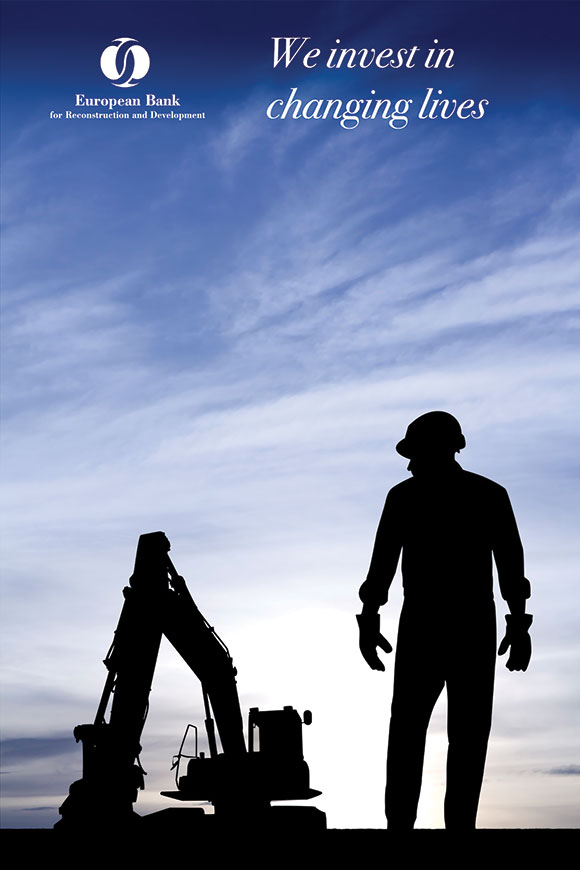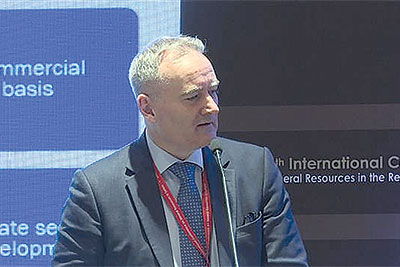Serbia may benefit from strong demand for critical raw materials coming from Europe, but it has to seek responsible investors who apply good corporate governance and best practices in their operations. EBRD may help in this process
The distribution of raw material supplies could result in a loss of competitive economic activity in Europe and reduced availability of strategically important products in the Renewables, ICT, automotive and aviation sectors. Therefore securing access to metals and minerals is a high priority for European countries.
“Attention is directed to mapping out the raw materials available for mining, since Europe has almost no extraction of antimony, beryllium, borates, magnesium, molybdenum, niobium, PGMs, phosphorus, rare earths, scandium, tantalum, titanium and vanadium,” says Eric Rasmussen, Director Natural Resources, European Bank for Reconstruction and Development (EBRD). “Moreover, the EU’s Raw Material Initiative focuses on the sourcing of raw materials, from international markets as well as from within the EU. Specifically, its Critical Raw Material List seeks to stimulate the production of critical raw materials in the EU and associated countries.”
Against this backdrop, it is evident that countries like Serbia, located along the mineral rich Tetyan geological belt, are well positioned to benefit from Europe’s increasing demand for critical raw materials.
As Rasmussen explains, “the EBRD has financed mining operations in EU and non-EU countries for more than two decades. The battery materials (copper, lithium etc.) deposits at the Timok reserve are generally of good potential and the EBRD would thus likely be able to support investors with mine development plans.”
What are the institutional preconditions for turning mining into a source of creating national wealth?
 – The countries will need quality investors to develop their mining industry sustainably. The EBRD invests alongside responsible investors, who apply good corporate governance and best practices in their operations, which are summarised in environmental, social, health and safety action plans (ESAP) and disclosed to relevant stakeholders. The EBRD also supports constructive institutional relations and good economic management.
– The countries will need quality investors to develop their mining industry sustainably. The EBRD invests alongside responsible investors, who apply good corporate governance and best practices in their operations, which are summarised in environmental, social, health and safety action plans (ESAP) and disclosed to relevant stakeholders. The EBRD also supports constructive institutional relations and good economic management.
In particular, the EBRD would support countries in the implementation of voluntary initiatives, such as the Extractive Industries Transparency Initiative (EITI), Publish What You Pay (PWYP) and/or the Responsible Mining Index (RMI). These voluntary initiatives can be a great help for countries and companies aiming to adopt sustainable mining.
How could the EBRD help mining companies increase their operational efficiency and become more competitive?
– The EBRD plans its financing based on due diligence, which includes – among other things – analysis of the energy and operating efficiency of mining companies. The EBRD has long experience of financing companies with the aim of implementing innovative technologies and new processes to become more resource efficient and hence reduce operating expenditures.
The EBRD Mining Strategy does not support the EBRD’s financing of thermal coal mining projects. If a coal deposit is a mix of thermal and metallurgical coal, then the EBRD cannot assist with financing for the mining
The EBRD recognises the potential negative impacts of mining when international environmental standards are not respected and economic diversification is not pursued. From that perspective, how do you evaluate policies in Serbia and the Western Balkans as a whole?
– The EBRD is mindful that investors in the mineral resources sector face significant challenges in most EBRD countries of operation, including those of the Western Balkans. Capital intensity, cyclicality and climate change pressures on the industry already demand strong balance sheets and organisational capacity for long-term survival. Moreover, mining investors have a substantial share of their portfolio of extractive and supply chain assets in remote places and emerging markets. However, emerging markets, many of which are located in the EBRD region, also increase the risk exposure to weak legal and institutional frameworks, among many other factors.
Weak legal and institutional frameworks are at the core of mining investors’ need for objective, neutral and fair rules-based institutions. However, economic and financial downturns – with their pressure on budget revenues – often trigger debates about renationalising natural resources or increasing taxes.

In places with weak legal and institutional frameworks, the mining resource investor can face a variety of interference that disrupts their rights and ability to control and operate a mine. The key threat is actions of state institutions (e.g. ministries, municipality administrations, agencies and SOEs). This is why a mining investor’s problemsolving capacity is evidently a critical success factor for an investor in a mine of strategic importance to a country.
The EBRD may assist the investor’s project company by diversifying its funding sources, providing financing for the tender that matches asset life and therefore supports the building of a stronger balance sheet with a leverage fit for purpose.
By having a resident office and investment portfolio in the host country (or region), the EBRD is well positioned to assist the investor in dialogue with the local government and, if needed, provide technical assistance to help the country adopt EITI and best practice standards for the environment, health, safety, social and stakeholder engagement.
The EBRD has gained the trust of its partners and is recognised for its experience and pragmatic attitude in helping mining investors to coordinate and resolve a variety of issues associated with a project’s diverse and multiple stakeholders (i.e. equity partners, banks, suppliers, competitors, unions, NGOs, courts, media, etc.), as well as diverse means to shape the behaviour of host countries’ leadership and government institutions. The EBRD is therefore well positioned to offer a problem-solving partnership for responsible investors operating in the EBRD region.
Preserving and improving the environment is a central feature of a modern and well-functioning market economy, and is therefore a key goal of the transition process that the EBRD was set up to promote
How can mining operations be conducive to local growth?
– The EBRD is supporting mining, because it contributes to economic and social development, with local communities often benefiting significantly from mining activities. The EBRD is also well aware that the potential benefits of mining resources are contingent on whether resources and associated revenues are developed and managed responsibly over time. Through its practical involvement in the mining sector, the EBRD implements its institutional mandate of promoting sustainable investments and dispersing best practices of resource development.
Serbia is heavily focused on coal extraction, which has high carbon intensity due to losses in production, transmission and distribution, as well as outdated infrastructure. What are the policies at hand to alleviate the problem?
– The EBRD Mining Strategy does not support the EBRD’s financing of thermal coal mining projects. If a coal deposit is a mix of thermal and metallurgical coal, then the EBRD cannot assist with financing for the mining.
How can other EBRD policies, such as those related to the green economy, contribute to sustainable solutions?
– The EBRD Mining Strategy has an overview of the various policies, all of which underpin the strategy. One of these policies is to promote transitions to a green economy, which is close to the heart of the EBRD. Preserving and improving the environment is a central feature of a modern and well-functioning market economy, and is therefore a key goal of the transition process that the EBRD was set up to promote. The EBRD’s approach to green transition builds on a long history of delivering sustainable investment projects.